International relations minister Netumbo Nandi-Ndaitwah this week said the decision by the Namibian delegation to abstain from the vote on the United Nations (UN) draft resolution on Monday, was not because it is indifferent to crimes against humanity, including genocide.
Namibia was one of the 15 countries that opted to abstain from voting on the adoption of the UN resolution titled: The Responsibility to Protect and Prevention of Genocide, War Crimes, Ethnic and Crimes against Humanity, at the end of the General Assembly on Monday.
The move received a barrage of criticisms from locals, specifically some traditional leaders of the Ovaherero and Nama communities.
“The reason we abstained was due to concerns with the application of the concept on the responsibility to protect which has been used to selectively target certain countries in pursuit of narrow interests of the few,” Nandi-Ndaitwah said in a statement on Wednesday.
She again reminded Namibians that the country does not and will never condone crimes against humanity and genocide.
“Namibia remains committed to defending human rights and ending human suffering through globally supported and internationally recognised multilateral bodies and institutions,” Nandi-Ndaitwah said.
She said while Namibia supports the Responsibility to Protect (R2P Doctrine), the primary responsibility to prevent crimes lies with states, as outlined in the first two pillars of the doctrine, the United Nations Charter and international law.
However, the politician explained that the discrepancies in the interpretation of the doctrine continue to hamper discussions on the matter, specifically within the context of the third pillar, and as such, its interpretation remains a serious concern and poses risks for abuse.
For this reason, she said, as a matter of principle, as the body created to deal with all matters related to peace and security, the Security Council and not the General Assembly, should be at the forefront of addressing the issue of the responsibility to protect.
Similarly, she said, the Namibian constitution Article 96 prescribes that disputes and conflicts should be resolved through negotiations.
Therefore, she said the unilateral decisions to interfere in other countries will be contrary to that principle.
“The international community, including the Security Council, must do its part to prevent atrocities and regulate the collective use of force,” she said, adding that there is no pretext for the use of force against states and safeguards must be put in place to protect against the vulnerability to surreptitiously interfere in the internal affairs of sovereign nations.
-ktjitemisa@nepc.com.na


